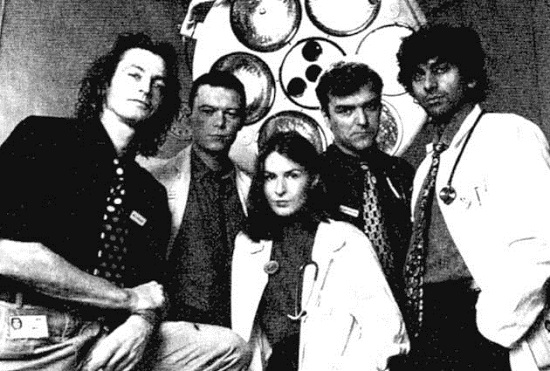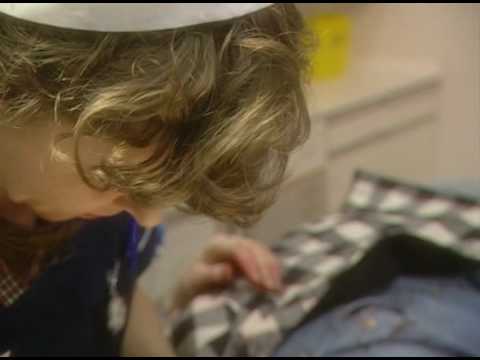Jed Mercurio is a big player in TV writing now – working on a new adaptation of Lady Chatterley’s Lover for the BBC after the success of the enjoyably twisty and overblown Line Of Duty , he’s also got a new ‘real-time’ medical drama, Critical. Mercurio has been here before, previously with Bodies and, most significantly to my mind, the BBC’s 90s medical black comedy/drama Cardiac Arrest. It is because of the latter that a TV series with Mercurio’s name attached to it automatically has my attention.
However when Cardiac Arrest first came to air in 1994, Mercurio was still a junior doctor at a hospital in Wolverhampton and appears on the credits under a pseudonym, John MacUre. Cardiac Arrest bristled with the indignation of someone who knew the NHS from the inside, and its overriding theme was that, contrary to the arguments of ‘modernisers’ who say that the NHS is in a mess and only privatisation can save it, it is actually managerialism that is responsible for that disarray. The cause of the sickness is being prescribed as the cure – not just the audits and endless forms that no-one really knows how to fill in, but all the pettiness, Kafka-esque logic and bullying tactics deployed by the hospital’s managers and, since this is a hospital, the casual endangering of life (of the patients) and sanity (of the staff) in the name of efficiency. Its message is therefore more timely than ever.
The focus throughout was on the system and its impact on individuals – I don’t think it’s doing the series any disservice to say that some of the characters were reasonably flimsy. Although the principle protagonists were granted more of an inner life as the programme went on, many can be seen as ‘types’, or caricatures if you’re being less charitable. But this is no more the case than in a standard medical soap, and of course CA used many standard soapy elements, which it frequently subverted to make a wider point. A good example is the plot line in the second series that saw suspicion fall on a nurse with a history of mental illness, following a couple of unexplained deaths in the hospital. The standard plot line would be that of the ‘crazy nurse’ murdering patients but in this instance the emphasis quickly moved to the impeccably Blairite (and this was still a couple of years before New Labour came to power) new administrator Paul Tennant (Andrew Clover) and his attempt at dealing with his dirty laundry, using the nurse as an easy scapegoat. In fact, it transpires that the ‘mental illness’ involved the nurse being treated for depression following her twin sister’s death, and that the fault lies in lack of training and stretched resources.
The first series, only six episodes long, is the most televisually static but also most rigorous and bracing of the three. Each episode began with shots of children playing and a voiceover from one of them explaining why they do (or don’t) want to be a doctor when they grow up. This idealism is obviously in stark contrast to the realities of hospital life. Andrew Collin (Andrew Lancel) is still basically a child in a grown-up world when he arrives (he looks almost painfully young, his frame too small for the white coat and often wearing oversized glasses), hopeful of making a difference, clinging to his Christian faith. Other members of staff (like Raj and James) survive by using ironic detachment as coping mechanism. Here though, we’re looking at something different from the standard ‘meaningless’ office job. Here it’s the case that too much responsibility is placed on the doctors, not too little, and this is not just in terms of the hours they work but also of public expectation. As Mercurio put it in an interview with the New Statesman:
"We were made to feel bad because we were not perfect like our television counterparts. We were resentful that our patients did not get better as quickly as they did on telly, or at all. We were resentful that the nurses weren’t angels. We were resentful that, when news programmes broke stories of medical calamities, they did not seem interested in how the system had failed, only in which doctor was to blame."
The impossibility of bridging the yawning gap between the hallowed ideal and the overwhelming demands of management and patients and a daily exposure to death and decay lead to another form of detachment – cynicism (the alternatives, as in the case of the bullied, over-stressed and unsupported Monica Broome, are alcoholism and eventually suicide). Dr Claire Maitland (Helen Baxendale) is presented as being the exact opposite of Andrew – hardbitten, uncaring, possessed of an incredibly dry wit and immune to the shit that surrounds her. Except of course she isn’t – throughout the first series, Andrew starts to find his feet in his new environment but also, through small acts of kindness, contributes, (along with the avoidable death of a child, something unbearable) to the partial decomposition of that facade, to her rediscovered sense of idealism. "I’ve got no speech. It’s just wrong" is how she calls off her affair with the bullying Simon Bettencourt (well that, and biting his nether regions) when he reveals the extent of his involvement in Andrew’s exploitation.
In the second series – which became a bit more slick and soapy, and introduced some more sympathetic characters like ‘Scissors’ Smedley, but also extended its analysis of management’s machinations – Andrew and Claire are shown to be respectful allies, and it’s Maitland who ends up going on a crusade when cost-cutting measures mean that she and Andrew are placed on call for the Ear, Nose and Throat department despite having little relevant experience or training. Again, there’s a crunch moment – a haemophiliac father with a nosebleed shockingly bleeds to death, all over her. She blows the whistle on the hospital, which she is perfectly within her rights to do, but is then suspended for not having paid a trifling sum for a carton of milk.
Together with Paul Tennant, the manager more interested in securing a five-star venue for his debut conference and spending money on having a TV crew film around the hospital as part of a PR exercise (Mercurio: "The uncertainty principle states that, in measuring a quantity, you alter it. Reel after reel of fly-on-the-wall footage from Jimmy’s or Children’s Hospital shows doctors playing doctor for camera.") the other big hate figure in the series is the superficially affable ‘old boy’ Doctor Turner, who tells Andrew at the beginning of Series 1 "My door is always open to you" ("Something he heard on Casualty a couple of years ago" says Claire) but who is more interested in golf and cricket and his private consultations than any of the staff or patients. He makes a show of empathising with the lot of his staff but never pitches in to help when they need it, always protects the interests of the manager, and uses his power of patronage to exert power over the junior doctors. ("Patronage will never die", he says)
After the nosebleed incident, he tells Claire that it is a tragedy and that he will make "a representation in the strongest terms" to the committee. Later, Claire sees ‘the committee’ through a window laughing and sharing drinks.
(In an interview in 1996, Harold Pinter said of his play Party Time: "I started with the idea of a party in a very elegant and wealthy apartment in a town somewhere. It became clear as I was writing that outside in the streets something else was happening. Gradually, it became clearer that what was happening in the streets, which was an act of repression, had actually been organised by the people in the room. But the people in the room never discussed it, just one or two fleeting references. They were happy drinking champagne and eating canapés and they were very, very happy. They knew it was all going well…. Without making any great claims, I believe it’s an image that has a universal reference.")
Consultant Surgeon Ernest Docherty is the ghost of NHS past who haunts the new hospital superiors. In opposition to their slickness and efficiency, he is bumbling and forgetful – but also a skilled surgeon, compassionate, a source of inspiration to other surgeons and clear-headed when he needs to be. His view of the past is undoubtedly rather misty-eyed (his presence was often accompanied by somewhat mawkish music) but he’s also a sharp-eyed observer of what’s going on around him ("I want no part in your brave new world" he tells Tennant) and at least tries to be a voice of sanity. Naturally, Tennant and Turner want rid of him, as that niggling reminder of the principles they are happily ‘rationalising’.
As Mercurio confirms, Cardiac Arrest was born of anger. You can feel it. One of the first series’ most powerful moments (one which undoubtedly sees Mercurio indulging in a little wish-fulfillment) sees Andrew, exhausted after having had no sleep for days on end, bleeped in the night to deal with one more patient. It’s Tennant’s predecessor, the man who has denied him leave or the chance to have any break at all, who has had a heart-attack and is now completely dependent on Andrew. "How safe do you feel?" Andrew asks him. The strongest aspect of this scene is that it’s played (and shot) as if it could be a fantasy on Andrew’s part. It was a minor disappointment when, in the second series, it was confirmed as actually having happened.
Although the production values were lower and the scope a little smaller, Cardiac Arrest has more in common with The Wire than Holby City. In the targets it hit (and I haven’t even mentioned the institutional racism, sexism, homophobia, the breakdown of stable relationships because of the impossible hours) it has a relevance that extends way beyond the NHS – I’d even go so far as to say that the treatment of Maitland’s whistleblowing echoes through the Wikileaks and Manning affairs. It’s was also often genuinely funny and strange, shot the way dream or memory sequences are, over-lit and suffused with white so that the image is often hazy, indistinct.
Accentuating the whiteness we all associate with hospitals to this degree contributed to the series’ oneiric ambience, and was highly suggestive in other ways – it’s like the sun in Camus’ L’Etranger, bleaching the landscape, erasing any moral contours that might guide the protagonists. The sense of unreality it created is also one that chimed with Mercurio’s comment that "When Cardiac Arrest was branded unrealistic, I understood that the TV mythology had usurped the truth." When certain fictions have become accepted as ‘truth’ then the truth turns fugitive and hides in unreality – in dreams and, paradoxically, in new fictions.
<div class="fb-comments" data-href="http://thequietus.com/articles/17369-cardiac-arrest-feature” data-width="550">



